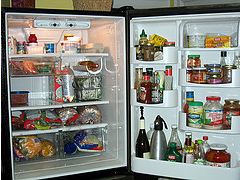How Long Is Refrigerated Food Safe To Eat After The Power Goes Out?

(kusine)
So you made sure to attack the rapidly melting pints of ice cream in your freezer when the power went out, but what about all that other food in your fridge— if it isn’t of the melting variety, how long is it safe without being refrigerated? Well first of all, don’t employ the “I’m just gonna taste this to see if it’s okay” test, warns the United States Department of Agriculture in its handy guide to post-power loss food safety.
During and after a power outage, the USDA says food “should be safe as long as power is out no more than 4 hours. Keep the door closed as much as possible. Discard any perishable food (such as meat, poultry, fish, eggs, and leftovers) that have been above 40 °F for over 2 hours.”
Any food that comes into contact with meat juices should also be tossed. From there, each item just has to be evaluated on its own using the USDA’s chart.
For example, in the meat, poultry and seafood category, basically everything should be tossed out if it’s been above 40 °F for over 2 hours. That includes pizza with any kind of topping, canned meats that have been opened, lunchmeats and more.
But other things like processed cheese or hard cheeses (Hard Cheeses: Cheddar, Colby, Swiss, Parmesan, provolone, Romano) or grated Parmesan are safe to keep and eat. Toss other shredded cheeses or low-fat options, however.
Bread, rolls, cakes, muffins, quick breads, tortillas are all safe to eat, but if you’ve got cooked pastas or casseroles, they need to get trashed.
Check out FoodSafety.gov’s chart in the source link below for rules on sauces, vegetables, fruits and other fridge foods and remember, the taste test is not a safe way to measure if your food is edible. When in doubt, just throw it out and turn to the peanut butter in your pantry.
Refrigerated Food and Power Outages: When to Save and When to Throw Out [FoodSafety.gov]
Want more consumer news? Visit our parent organization, Consumer Reports, for the latest on scams, recalls, and other consumer issues.

